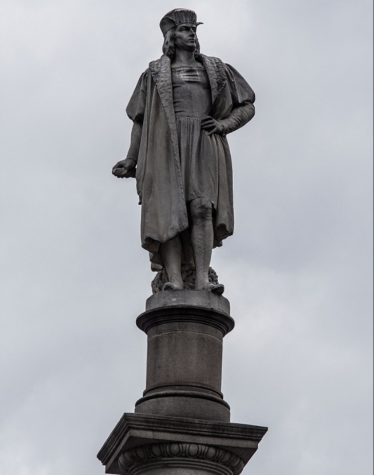Historical monuments take heat from public
With the amount of news reports which involve racist accusations, it’s no surprise the removal of “racist” statues has taken over the news. Recently, there has been sudden outrage over statues in our country that have stood tall for the last century.
On Aug. 26, a rally was held in New York City to push for the removal of a Christopher Columbus statue. According to Daily Mail, claims were made that despite his credit for being the founder of western civilization, Columbus is a symbol of hate due to his mistreatment of the Native Americans and involvement in slave trade. Protesters claim that because of these two horrendous attributes there should never have been a memorial dedicated to Columbus.

“Statues like this should be kept in graveyards and in museums as pieces of history, but not in public areas. They may not be intended to be symbols of hate, but that is what they end up representing,” junior Delaney R. said.
Due to the recent call to remove statues such as Columbus’, Americans have been re-evaluating the historical record of almost every man and woman honored with a statue or memorial in this country. Anyone who has been involved with slavery or mistreatment of Native Americans is now judged on whether they should be commemorated.
However, we have to look no further than our very own founding fathers to find individuals who fit this description. The first president of the United States, George Washington, did in fact own slaves. Should we now race to the capital city, grab our signs and storm the streets to protest the “extremely offensive” statues, memorials and monuments honoring our founding fathers? Of course not. The point is the possession of slaves and mistreatment of Native Americans should not be the decisive factors on someone’s legacy. Equality will never be reached if Americans try to erase history. Every person has a dark past and trying to wipe them away from the public eye is not how to learn from the past. If the removal of memorials of people like Columbus is allowed, a door opens to a new realm of infinite possible “offensive” pieces of history. Should we also take down memorials to Thomas Jefferson, the primary author of the Declaration of Independence, because of his slave ownership? Should we remove statues of Abraham Lincoln because of his negligence to aid the dying Sioux Native Americans, or remove memorials of Richard Nixon because of Watergate? The possibilities are endless, which is why America needs to address the issue and draw a line.
“It’s important to know that people like Columbus were from a different era of history. I don’t think that excuses what they did, but it helps us understand a little more about why and how these things happened,” U.S. History teacher Tyler Shaw said.
Yes, America has its fair share of dark spots in history. Mistreatment of Native Americans, slavery and the Civil War are all pieces of the past we clearly are not proud of. However, if people eliminate everything that hints at offensive content, pieces of history will start to disappear. These statues and memorials are historical artifacts as well as symbols of triumph in overcoming our wrongdoings through history.
In addition to people like Columbus’ statues being questioned, there has been a sudden call for removal of many statues in the South which honor soldiers of the Confederacy. Like Columbus, these honorees are seen as dark spots in American history, and there are people who wish to see their remembrance wiped out. However, there are some who refute this idea and see these people as important pieces of history despite their wrongdoings.
“Most people in the South view statues of Confederate soldiers and generals as a reminder of what our families once did. We do not take pride in everything they stood for, but we take pride in the fact they were willing to fight for what they believed, and the statues represent that,” Jackson H. ‘18 said.
Jackson lived in Alabama before he moved to Olentangy High School freshman year, so he was surrounded by these statues growing up. He said despite the popular belief that Southerners see these statues and memorials as symbols of racism or hate, most see them as “pieces of their own history they will not forget.”
Many of the people living in the South have traceable ancestors who fought in the Civil War, and although they do not agree with what they believed in, they are family nonetheless, and should not be removed from history.
In the end, this is not a debate on whether we should commemorate our dark past or not, but instead a fight to remember those who gave up their lives for what they believed in. All of the soldiers seen on Confederate statues are the family of people living right now. Many of the people who we now see as wicked slave owners were also those who laid the foundation for our country. Their legacy is the country’s history and instead of trying to hide it away, we must honor those who have allowed us to be here today, while learning from the mistakes made in the past.